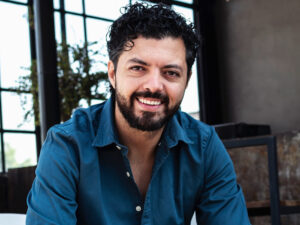Editor’s Note: Michael Dean is founding partner of global agri-foodtech VC AgFunder, which recently invested in Singapore-based Singrow, a vertical farming startup. All views expressed are his own and not of AFN’s editor or team of journalists.
If you’ve ever tried buying strawberries in Singapore, the chances are you’ve ended up disappointed.
It’s difficult to grow strawberries at scale in lowland tropical climates. The ones sold in Southeast Asia’s supermarkets have to be imported from more temperate regions.
Those strawberries that do make it into stores in Singapore and other Southeast Asian cities tend to fall into two groups: expensive and insipid or sour-tasting fruit that was harvested prematurely ahead of cold-chain transit from Australia, China, or North America; or tastier but even more expensive berries airflown from Japan and South Korea. These typically arrive on Singaporean shelves mummified in layer upon layer of plastic packaging, deployed in a no-holds-barred effort to preserve freshness and aesthetics.
This is not unique to strawberries; Southeast Asian countries also struggle to get hold of other fruits and vegetables such as stone fruits, melons, asparagus, Brussels sprouts, and nightshade vegetables.
So if Southeast Asians are to continue enjoying their strawberries, and the rest, a more sustainable solution is needed. One that, given the climatic and geographical limitations of cities like Singapore, requires a helping hand from technology.
That’s why we’re proud to welcome Singrow to the AgFunder portfolio.
Born out of the National University of Singapore (NUS), Singrow is directing its efforts towards local production of fruits and vegetables in tropical areas. And it’s starting with strawberries, which is a several hundred million dollar market in Southeast Asia, and far larger ($7 billion-plus) if you look to neighbours like China.
The team
The founding team is made up of NUS scientists Bao Shengjie, Xu Tao, and Yu Hao – Singrow’s CEO, chief technology officer, and scientific advisor, respectively.
With a PhD in molecular biology, Bao is a plant physiology expert who has focused his research on expediting growth and improving yields. Also pursuing a doctorate in molecular biology, Xu is a specialist in hydroponics systems; while Yu is head of biological science at NUS, and a globally recognised expert in functional genomics, plant growth regulation, and plant physiology.
We first saw them in front of a crowd of 200 investors and industry execs at an NUS Graduate Research Innovation Programme (GRIP) pitch day last year. Running twice a year, GRIP selects 25 teams from across NUS researchers and postgraduate students to equip them with entrepreneurial skills and experience and get them in front of prospective investors and industry partners.
Bao impressed us with his confident and engaging on-stage delivery, and his ability to see Singrow’s technology in commercial, rather than just academic or scientific, terms.
He made clear that Singrow isn’t just looking to be another vertical farmer selling leafy greens. That’s when we invited the team to join the first cohort of the GROW Accelerator, our Singapore based agri-foodtech accelerator program. And it’s why we’re returning to invest in them again through AgFunder’s Co-Investment Fund III.
The tech
Singrow’s holistic approach to controlled environment agriculture really stood out. To grow strawberries locally in a densely urbanized tropical setting such as Singapore, an ‘out-of-the-box’ vertical farming setup – already offered by plenty of startups around the world – isn’t enough.
Instead, Singrow provides an entire agricultural system, from breeding to growing, all the way to harvesting.
At the breeding end, it has developed two proprietary strawberry cultivars that are better suited for Southeast Asia’s tropical climate, and should also do well in desert-like conditions.
Why does that matter if they’re being grown indoors where the climate can be controlled? Energy costs. Typically strawberries grow best at around 15 to 25 degrees celsius, so to keep an indoor environment at those temperatures in Singapore — where temperatures average 32 degrees year-round — requires a lot of cooling. Singrow’s strawberries thrive at temperatures of up to 28 degrees celsius, requiring up to 40% less energy in controlled environment agriculture systems.
And for both growing and harvesting, Singrow is focused on manipulating the plant’s architecture towards greater operational and process productivity and efficiency. It has built a patent-protected hydroponic rack, which is specifically designed for its cultivars. These are titled in such a way that the fruit grows outwards and overhangs the rack. This allows the harvesting process to be easily automated, with a robot driving alongside the rack to simply snip off the strawberries rather than having to reach up and pick them. Its proprietary AI platform also helps with pollination, pruning, and runner propagation, all of which are enabled by these unique vertical racks.
As a deliciously critical part of our due diligence process, we taste-tested Singrow’s strawbs. Until they’re more widely available you’ll have to take our word for it, but with a Brix (sweetness) score of 12, they were certainly sweeter and more flavorsome than the usual Singapore supermarket fare which typically has a Brix score of around 6.
The future
Given its limited space and lack of cultivable land, Singapore relies on imports to cover 90% of its nutritional needs. The supply chain disruption wrought by Covid-19 has underlined how reliant the city-state is on external sources for its food, pushing the Singapore government’s ‘30 by 30’ initiative — to have 30% of its nutritional needs domestically produced by 2030 — to the top of the policy agenda.
AgFunder and its Asia-Pacific accelerator GROW are supporting the ‘30 by 30’ goal through the Singapore Food Bowl program. Find out more and apply before 7 June here.
For its next trick, Singrow wants to leverage its technology to move beyond strawberries to develop cultivars of other crops that can be grown in controlled conditions in Singapore, such as grapes and saffron. This aligns perfectly with the city-state’s ‘30 by 30’ goal – as well as other urban communities looking to produce more of their food locally.





